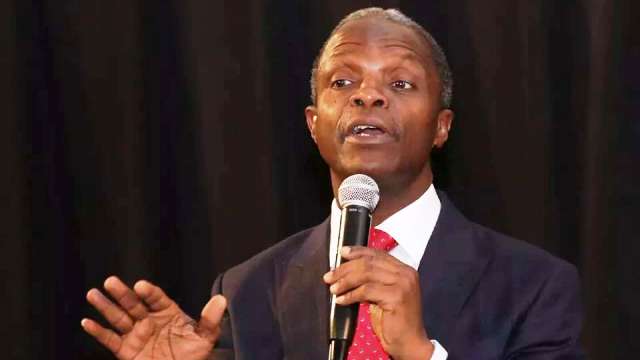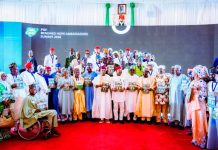ABUJA (VP’s Office’ Report)- The Vice President, Yemi Osinbajo (Prof), has emphasized the need to evolve a unique approach to address endemic corruption in Nigeria, noting that a coalition of reasonable Nigerians across all strata of society was required to develop the new approach.
While speaking at the opening session of a workshop on the role of the legislature in the fight against corruption in Nigeria, Prof. Osinbajo urged the Nigerian bureaucratic, political, business and religious elite to lower themselves in order to achieve the goal of eradication corruption in Nigeria.
He said, “Indeed we have a chance to develop a uniquely Nigerian approach to deal with this problem. I think it is important for us to be humble and clear headed enough to understand that the coalition that should emerge from such a consensus is not a coalition of saints, neither can it be a conclave of only righteous men and women bound by holier than thou creed and a crusading view. No, that will fail”
“What we need is a coalition of reasonable men and women of the Nigerian bureaucratic, political, business and religious elite. Men and women who believe that the proposition that corruption does not pay is not merely a moral injunction, that it is an admission of a grave reality in commerce, in governance or whatever other field of human endeavor.’’
According to him, ‘’That corrupt executive, for example, will destroy all plans of development, a corrupt legislature will use its legislative and oversight functions to enrich itself and compromise its roles of checks and balances, and the corrupt judiciary will sell its powers over life and death to the highest bidder and will turn society to the anarchical notion that self-help is best”.
Prof. Osinbajo said that corruption exhibited in all spheres of a nation’s life would dampen the morale of the citizenry and destroy its confidence in public and private institutions. He said the fact that corruption had become pervasive should not discountenance the importance of political leadership in the society.
Adding, “The reason why we elect men as leaders in the executive, legislature and why we appoint men in the judiciary is that we desire an orderly society where we entrust the power to make decisions about how to spend our collective resources for the common good to a few, because reasonable men and women discovered long ago that if we allow everyone to take care of themselves, we will remain in the state of nature fighting like savages for our own portion of the meat.’’
He further said that the power to adjudicate on the lives and livelihoods to the fairest and most honest in the society was anchored on the need to maintain law and orderliness in mixed society of the weak and the strong.
Prof. Osinbajo said the global practice of fighting corruption was straightforward, not necessarily for altruistic or moral reasons but first to protect even the elites from being consumed from the chaos and the conflict that the corruption might cause.
“We have an opportunity today to begin an important national project and I wish to emphasize that this should not be a finger pointing exercise. What is required is a consensus of reasonable men and women who realise that the current path will destroy us all, that such a consensus will produce a coalition of the like-minded from the executive, the legislature and the judiciary, united by a common cause and proposition namely; that this Republic will fall and consume us all if we do not put in place a practical plan to clean up our crucial public and private institutions.’’
Earlier in his presentation, the Guest Speaker at the event, Prof. Patrick Lumumba called for concerted efforts among all arms of government and a genuine change among the political elite, to address the challenge of corruption in Nigeria.
He said that the attitude of the elites must be such that can drive the desired reforms in institutions fighting corruption in the country.
Lumumba challenged the Nigerian elite to lead the campaign for economic revival and fight against corruption in the African continent, noting that no genuine reform in the continent could be possible without Nigeria.





